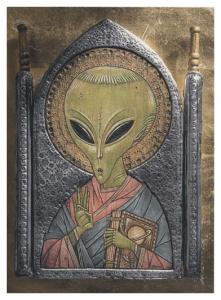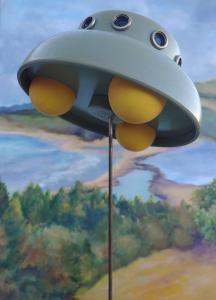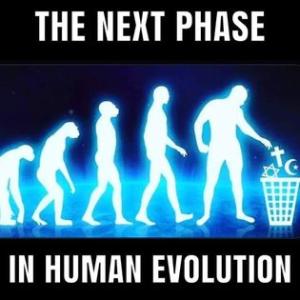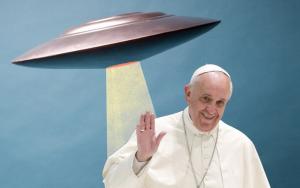 Are Alien Scientists the Real Gods?
Are Alien Scientists the Real Gods?
SR 1171 UFO 1
“An advanced scientific civilization could be an approximation to what we called ‘God’.” This is what Harvard astronomer Avi Loeb told those attending the “Our Future in Space” program at the Washington Cathedral on November 10, 2021. Watch carefully: Avi Loeb touts the ETI myth.
Will aliens put Yahweh of the Bible out of a job? Will Shiva, Vishnu, Marduk, and the Great Spirit also line up for unemployment checks?
Avi Loeb wants a hundred million dollars for his Galileo Project to analyze reports of UAP (Unidentified Aerial Phenomena) and to search outer space to find artifacts of extraterrestrial civilizations. Where will Dr. Loeb get that money? From Uncle Sam?
This post follows up on a previous Patheos entry, “Would confirmation of extraterrestrial intelligent life cause a crisis for terrestrial religion?”
Uncle Sam’s Money
The Galileo Project already has a few private funders. What about big money from big government?
Recall how on June 25, 2021 the Director of National Intelligence, Avril Haines, shared her intelligence regarding UAP with the U.S. Congress: Preliminary Assessment: Unidentified Aerial Phenomena. This inane and vacuous public report confessed ignorance about the subject and then asked for research funding. This invites pan handling at the federal level.
Such pan handling may be effective. New York Senator Kristin Gillibrand read the 400 page classified appendix to the public UAP report. On November 4 she tacked amendment SA4281 on to H.R.4350 National Defense Authorization Act for Fiscal Year 2022. This amendment would include establishing the Anomaly Surveillance and Resolution Office. Gillibrand asks that “scientific, technical, and operational analysis of data gathered by field investigations” rise to the highest level for review. Her amendment includes government funding for Avi Loeb’s Galileo project mentioned above.
Immediately, MUFON (Mutual UFO Network) broadcast an urgent message. “MUFON is asking our members…to put pressure on the United States Senate and House of Representatives to pass this amendment to the Defense Bill.”
The Galileo Project’s Dilemma
Let’s pause a moment to assess this. Might we see a dilemma on the horizon? The value of a scientific examination of the UAP would be found in its objectivity, transparency, openness. The entire world could benefit from the new knowledge generated by the Galileo project.

But, might this transparency be jeopardized once the filthy lucre of the DOD (Department of Defense) gets a hold of it? If Dr. Loeb’s researchers want access to classified data, they will then be restricted from publishing that data.
The problem gets more ominous. If the DOD believes that UAP pose a security threat, armies may aim guns and missiles and social venom at extraterrestrial tourists visiting our planet on holiday.
It’s my judgment that we earthlings have no evidence whatsoever that UAP–even if piloted by ETI–are a threat. Yet, federal paranoia could risk letting scientific light slip down a dark hole and disappear.
ETH (the Extraterrestrial Hypothesis)
When we invoke science to investigate UAP, must we also invoke the ETH? One new organization—ICER (International Coalition for ETI Research)–answers in the affirmative.
“ICER believes all countries now need to prepare for confirmation that the Earth is being engaged by non-human intelligences and proposes ‘awareness’ programs be established to deal with the profound issue of Contact and its global implications.”
In principle, ETH is just what it says: a hypothesis. An open and transparent scientific investigation might come up with multiple alternative explanations that fit different forms of the phenomenon. Frankly, I hope to make new alien friends in my lifetime. Let’s watch and see.
Applause for the Scientific Study of UAP
Before going any further, let me state unequivocally that I support the scientific study of UAP and I support Senator Gillibrand’s amendment. My colleagues and I at SCU (Scientific Coalition for UAP Studies) welcome with open arms the employment of scientific instrumentation and transparent data assessment of aerial anomalies. In his own way, Avi Loeb has brought sunlight into the hitherto darkness surrounding the involvement of scientists in UFO investigation. Let’s hope he protects that sunlight from the black hole of national security. [For an update see: Are UFOs Real? A Sea Change?]
But, as you suspected, there is more. UFO experiences and speculations about the ETH constitute a cultural phenomenon. What is going on here requires much more than science alone can deliver. This is where the public theologian should enter with discourse clarification.
The ETI Myth: Science Practicing Theology without a License
Professor Loeb wants more than merely scientific data gathering. He wants science to replace theology; and he wants the scientist to replace God. And, if terrestrial science falls short of apotheosis, then a more advanced extraterrestrial science can do the job. In short, Avi Loeb touts the ETI Myth.

While at the Washington Cathedral, Loeb prefaced his speculations about ETI with two observations. First, scientists now on Earth are ready to create synthetic life in the laboratory. Second, if in the future when scientists combine quantum mechanics with gravity, we will be able to create a “baby universe” right in our own laboratory. Loeb also tried to startle the religious people in the audience by averring, “God in many religions was the creator of life and the creator of the universe.” Here is his point: today’s scientists are ready to replace yesterday’s gods.

Does this count as reliable science? No. When he replaces the divine in traditional religion with a new pantheon of gods wearing white lab coats, Loeb is practicing theology without a license. Whether these scientific gods are extraterrestrial or terrestrial, this combination of pseudo-science and pseudo-theology leads to a self-proclaimed apotheosis.
Dr. Loeb is touting what I call the ETI Myth. The ETI Myth assumes that biological evolution is progressive and that progressive evolution over a longer period of time on exoplanets will have produced alien creatures with higher intelligence than Earth’s human race. The more intelligent aliens, according to the ETI myth, will be more advanced than earthlings in science, technology, medicine, ethics, and secularization.
The fundamental assumption of this myth—that evolution is progressive in the same sense that science and technology are progressive—is not sustained by our evolutionary biologists. In fact, the doctrine of progress is repudiated. (Francisco J. Ayala provides and example: “life has evolved in a haphazard fashion.”) Myth advocates such as Dr. Loeb presuppose something that their colleagues in the biology lab across the hall disavow.

The myth continues. When contact is made, Earth will be blessed by the aliens. In short, science saves, and more advanced extraterrestrial science will bring salvation to the less highly evolved Earth. The ETI Myth is not sound science. Rather, it’s a religious yearning dressed in scientific garb. If astronomers and astrobiologists would eliminate the self-serving ideology embedded in the ETI Myth, their scientific research programs might become more trustworthy. Science should stick to science rather than practice theology without a license.
Discourse clarification demonstrates that the ETI myth is a form of pan handling to the wider culture. It is an attempt on the part of scientists to claim the top of the mountain in intelligence, knowledge, and power. It is hegemonic, as our postmodern friends might aver. The ETI myth is intended to crown the scientist king and lord and ruler.
Conclusion
If you’d prefer a Harvard astronomer who affirms both the wonders of the cosmos as well as the glory of God without myth, try reading Owen Gingerich’s fine book, God’s Planet. It is possible for a scientist to appreciate God’s creation without trying to become God.
At the Washington Cathedral event, David Wilkinson spoke in tandem with Avi Loeb. Dr. Wilkinson is both an astronomer and theologian who teaches at Durham University. Dr. Wilkinson loves God and loves the universe God made and does so without appeal to any myths. I strongly advise reading David Wilkinson’s Science, Religion, and the Search for Extraterrestrial Intelligence.
Finally, through discourse clarification, the public theologian pleads with scientists to remain scientists. Solid scientific data gathering and analysis devoid of the unfounded ETI myth is much preferred over practicing theology without a license.
More on UFOs
Are alien scientists the real gods?
Would confirmation of extraterrestrial life cause a crisis for terrestrial religion?
Are UFOs demonic?
▓
 Ted Peters directs traffic at the intersection of science, religion, and ethics. Peters is an emeritus professor at the Graduate Theological Union (GTU), where he co-edits the journal, Theology and Science, on behalf of the Center for Theology and the Natural Sciences (CTNS), in Berkeley, California, USA. Along with Martinez Hewlett, Joshua Moritz, and Robert John Russell, he co-edited, Astrotheology: Science and Theology Meet Extraterrestrial Intelligence (2018). Along with Octavio Chon Torres, Joseph Seckbach, and Russell Gordon, he co-edited, Astrobiology: Science, Ethics, and Public Policy (Scrivener 2021). He is also author of UFOs: God’s Chariots? Spirituality, Ancient Aliens, and Religious Yearnings in the Age of Extraterrestrials (Career Press New Page Books, 2014). Regarding UAP, he served as the Louisiana State Director for MUFON 1976-1978 and is currently active in the Scientific Coalition for UAP Studies (SCU).
Ted Peters directs traffic at the intersection of science, religion, and ethics. Peters is an emeritus professor at the Graduate Theological Union (GTU), where he co-edits the journal, Theology and Science, on behalf of the Center for Theology and the Natural Sciences (CTNS), in Berkeley, California, USA. Along with Martinez Hewlett, Joshua Moritz, and Robert John Russell, he co-edited, Astrotheology: Science and Theology Meet Extraterrestrial Intelligence (2018). Along with Octavio Chon Torres, Joseph Seckbach, and Russell Gordon, he co-edited, Astrobiology: Science, Ethics, and Public Policy (Scrivener 2021). He is also author of UFOs: God’s Chariots? Spirituality, Ancient Aliens, and Religious Yearnings in the Age of Extraterrestrials (Career Press New Page Books, 2014). Regarding UAP, he served as the Louisiana State Director for MUFON 1976-1978 and is currently active in the Scientific Coalition for UAP Studies (SCU).
▓
Bibliography
Gingerich, Owen. 2014. God’s Planet. Cambridge MA: Harvard University Press.
Peters, Ted. 2021. Are UFOs Secret Technology or God’s Chariots?
Peters, Ted. 2021. “Astrotheology’s contribution to public theology: From the extraterrestrial intelligence myth to Astroethics.” HTS Teologeise Studies 77:3 1-8.
Peters, Ted. 2018. “Introducing Astrotheology.” In Astrotheology: Science and Theology Meet Extraterrestrial Life, 3-26. Eugene OR: Cascade Books.
Peters, Ted. 2021. Reasons for the Hope Christians Have.
Peters, Ted. 2011. “The Implications of the discovery of extra-terrestrial life for religion.” The Royal Society: Philosophical Transactions A 369: 644-655.
Peters, Ted. 2008. The Peters ETI Religious Crisis Survey. Seattle: Counterbalance.
US, Office of the Director of National Intelligence. 2021. Preliminary Assessment Unidentified Aerial Phenomena. Washington DC: US Government Printing Office.
Wilkinson, David. 2013. Science, Religion, and the Search for Extraterrestrial Intelligence. Oxford: Oxford University Press.














